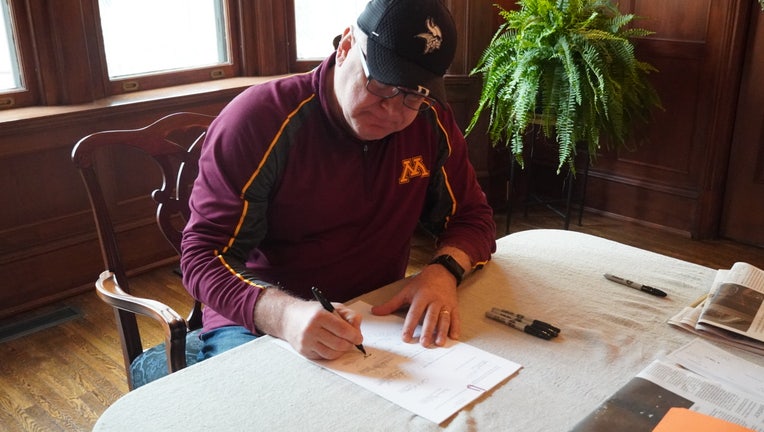Minnesota Governor signs 11 new laws, including ban on chemical TCE

Gov. Tim Walz signed 11 bills into law Saturday at his residence in St. Paul.
ST. PAUL, Minn. (FOX 9) - Gov. Tim Walz signed 11 bills into law Saturday, most notably including Tobacco 21 and a ban on the chemical trichloroethylene.
Tobacco 21 was first introduced to the Minnesota legislature three years ago before being passed last week. Walz and Lt. Gov. Peggy Flanagan said the Tobacco 21 and the ban on trichloroethylene, or TCE, are important public health achievements.
“We’ve seen too many lives ruined by these toxic chemicals – both TCE and commercial tobacco,” said Flanagan. “Minnesotans, especially our children, will be safer and healthier with these bills signed into law.”
The TCE ban will go into effect by June 1, 2022. The bill also includes up to $25,000 in zero-interest loans for small businesses to transition away from the industrial solvent.
Minnesota is the first state to ban TCE, which is known to increase risks for some types of cancer.
The author of the bill, Rep. Ami Wazlawik (DFL-White Bear Township), said, “The credit for this accomplishment belongs to the dedicated Minnesotans who fought to ban TCE, many of whom were exposed to the toxic chemical in their own communities.”
Most notably, TCE impacted the residents of White Bear Township, Minnesota, where residents sued the Minnesota Pollution Control Agency after they were exposed to TCE from the Water Gremlin plant in 2019.
Here are the other nine bills Gov. Walz signed into law Saturday:
Protecting vulnerable adults from financial exploitation
Establishes new financial exploitation protections for older adults and vulnerable adults by expanding authority under the 2018 Safe Seniors Financial Protection Act.
Data Practices Omnibus Bill
Contains five policy provision: regulation of drones by law enforcement through a warrant requirement; clarify the requirement of a search warrant for electronic communication information; clarify statute regulating warrants for location-tracking devices; expand the scope for when a warrant is required for location tracking; and changes to publication criteria for court of appeals opinions.
Revisor’s Bill
Annual bill from the Revisor of Statutes. It is a compilation of technical corrections to sections of statute.
Civil Law Omnibus Bill
Contains four policy provisions related to civil law: modernize Minnesota Guardianship Law to create a more person-centered approach in statute; update to Uniform Transfers to Minors Act; amend the Common Interest Ownership Statute in homeowner association voting procedures; and amend the statutory formula that determines the percentage of wages that are able to be garnished.
City Charter Commissions
Existing law allows city councils for charter cities to appoint new members to those cities’ Charter Commissions if the chief judge of the district court in which the city is situated fails to make an appointment within 30 days. This bill removes that authority for city councils, so that the chief judge of the district court has responsibility for appointments and reappointments.
Agriculture Policy Omnibus
Includes language creating a working group to advise the Commissioner of Agriculture and legislature on ways to support emerging farmers. It specifies that the group must include, to the extent possible, women, people with disabilities, people of color and indigenous people, and young urban farmers. Revisions to existing law on hemp processing, including authorization to undertake rulemaking. Technical changes to Seed Law, Agriculture Best Management Practices loans, and the noxious weed program.
Eyewitness Identification Policies
Requires the Minnesota Peace Officers Standards and Training Board to create a model policy for eyewitness identification. The policy then must be adopted by law enforcement agencies throughout the state. The four requirements in the bill are based on recommendations in a 2014 report by the National Academy of Sciences.
Job Training Grant Modifications
Updates and modernizes the Department of Employment and Economic Development’s Job Training Grant program.
Electronic Signatures Accepted
Allows local governments to accept e-signatures and electronic submittal for certain types of documents during the COVID-19 emergency and for 60 days thereafter or until January 6, 2021, whichever is earlier. The list of documents includes, among others, planning and zoning applications, applications for birth and death certificates, plats, and surveys.

